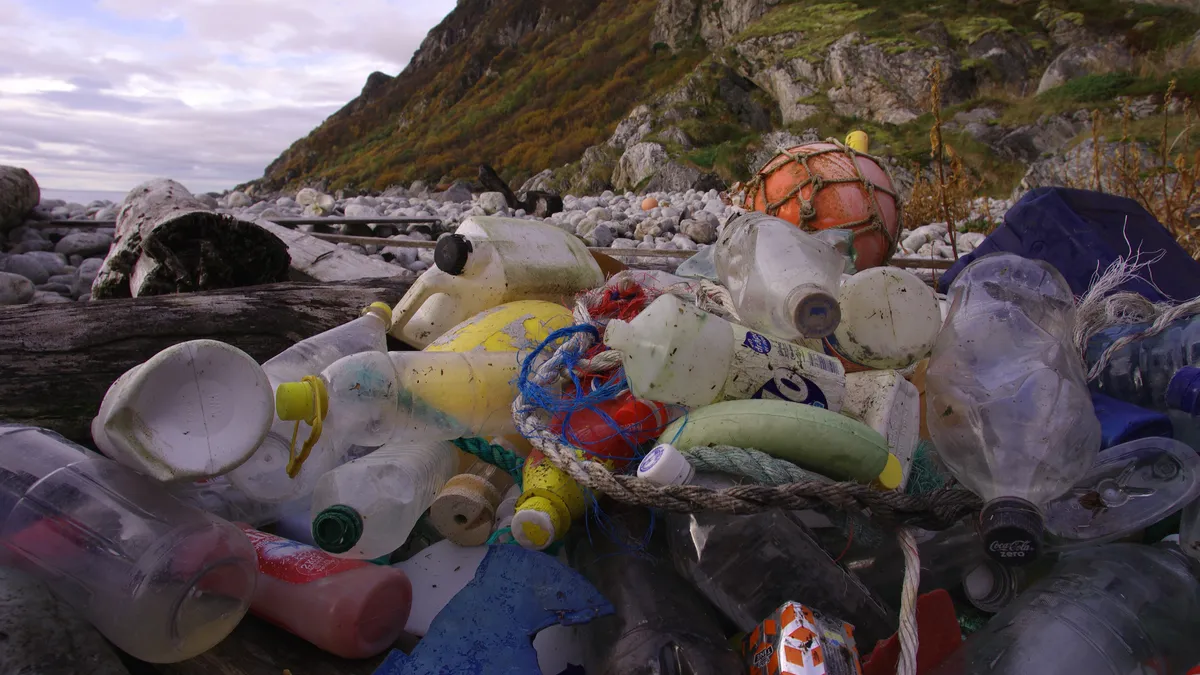Dive Brief:
- On Monday, the European Commission officially proposed banning the single-use plastic products most often found on Europe's beaches: plastic cotton buds, cutlery, plates, straws, drink stirrers and balloon sticks. All of these materials would need to be made from alternative, sustainable materials once the ban is in place.
Plastic waste is an issue people really care about. 87% of citizens are concerned about the impact of plastic pollution on the environment. pic.twitter.com/iAHuFgR6Nw
— Frans Timmermans (@TimmermansEU) May 28, 2018
- The proposal also calls for all European Union (EU) member states to set consumption targets to reduce the use of plastic food containers and drink cups, and to collect 90% of single-use plastic drink bottles by 2025 through deposit refund schemes.
- Awareness is also a key element of the proposal. Sanitary towels, wet wipes and balloons would be subjected to labeling requirements that indicate proper disposal practices, while producers would be required to implement measures that raise littering awareness.
Dive Insight:
This announcement follows reports from earlier this year that the EU would potentially propose a tax on plastic packaging and plastic bags to reduce usage; however this proposal more efficiently meets the Commission's promise "to be big on the big issues" by outwardly banning such single-use materials. In a press statement, the Commission says these rules will put Europe "ahead of the curve on an issue with global implications," most likely pointing at China's scrap import policies.
The Commission is urging the European Parliament and the European Council — who must approve this proposal — to treat it as a priority, as the EU is hoping to hit a number of related Sustainable Development Goals by 2030. The Commission hopes the proposal can be finalized before the European elections in May 2019, and in the meantime will launch an EU-wide awareness campaign to highlight citizens' role in combating plastic pollution.
Due to the proposed timeline, the U.K. is not likely to feel the effects of this proposal because of its scheduled exit from the EU on March 29, 2019. The Guardian reports the Commission's First Vice President Frans Timmermans has "challenged" the U.K.'s environment secretary Michael Gove to outdo the EU's environmental efforts, telling reporters, "What I hope for after today is a race to the top, and I invite all those who said the EU is too slow — whether they are Michael Gove or others — to join us in this race to the top. Lets see who does best at this."
The U.K. already entered this race by pushing toward similar initiatives. Prime Minister Theresa May announced in January her intention to phase out "avoidable" plastics by 2043, and has since pledged £61.4 million ($71 million USD) in funding to reduce marine plastic pollution. The U.K. has also hinted at a countrywide ban on plastic straws, a move that some U.S. cities and companies are similarly considering.
Unlike some European countries and Canada, the U.S. has a ways to go to stay competitive in that sustainability race. It currently lacks any national plastic policies — outside of an Obama-era ban on microbeads that went into effect on July 1, 2017 — and most relevant packaging regulation occurs at the state or local level. While a growing number of local governments have begun taking positions on the issue, their approaches vary widely and carry less weight than any type of cohesive national approach.















